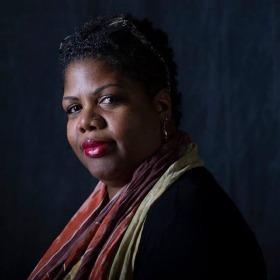Petrouchka Moïse Honored for Haitian Art Research in Le Nouvelliste | https://www.grinnell.edu/news/petrouchka-moise-honored-haitian-art-research-le-nouvelliste
Petrouchka Moïse Honored for Haitian Art Research in Le Nouvelliste | https://www.grinnell.edu/news/petrouchka-moise-honored-haitian-art-research-le-nouvelliste
Petrouchka Moïse, assistant professor and cultural and community-based digital curator, was featured in prominent Haitian publication Le Nouvelliste last month. The article tracks Moïse’s extensive research career and highlights her recent work as a Mellon post-doctoral fellow and co-leader of the Haitian Art Digital Crossroads project.
The HADC project is a collaboration between the College and the Waterloo Center for the Arts, and is headed by Moïse and Fredo Rivera, assistant professor of art history. The project aims to make the Center for the Arts’ Haitian collection (the largest publicly held collection in the world) digitally accessible, with an ultimate goal of creating a “digital hub for a network of online resources in Haitian and Caribbean studies.”
Le Nouvelliste spotlighted Moïse as an innovator in the Haitian art research scene, and specifically applauded their exploration of art and collective-trauma-healing.
For Moïse, recognition from a highly regarded Haitian publication was remarkable.
“You never know who's watching what you are doing. I was informed by a Facebook alert that my name was posted, and the next thing I know I'm a feature in Haiti's oldest newspaper... My ancestral home of Haiti is saying ‘I see you in the corn!’” she said.
Beyond being groundbreaking in its field, Moïse’s Haitian research is also of personal significance.
“Grinnell College has given me the space and support to visualize, build and represent the best of Haitian art and culture through the HADC project, as well as reimagining my narrative as a Haitian artist and scholar,” she said. “Growing up, I decided that Haiti would not only be marked by my parents’ departure, but would be marked by my efforts to return... and I have spent my life not just being Haitian by default, but being Haitian by right.”
Both Le Nouvelliste and Moïse recognize that the research conducted through the HADC will have wide-reaching implications for the field of Haitian studies. By creating a publicly available database of Haitian art, individuals around the world will have the opportunity to study a collection rich in Haitian history.
“My work with HADC lays the groundwork for scholars to contribute as we build awareness and appreciation for the contributions of Haitian art and culture across different landscapes,” Moïse said.
Original source can be found here.



 Alerts Sign-up
Alerts Sign-up